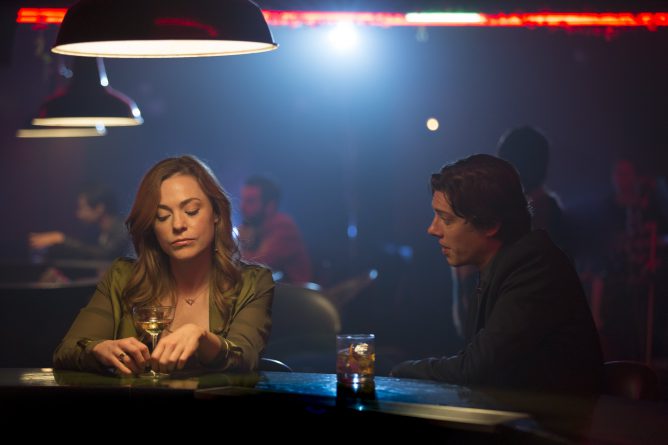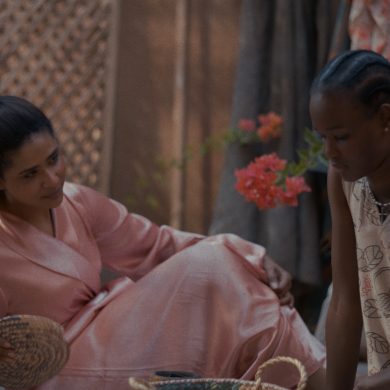This review contains discussions of sexual assault.
The thin plot of David Barker’s directorial debut, Pimped, follows apparently wealthy Lewis Blake (Benedict Samuel) and his pal Kenneth Hanson (Robin Goldsworthy) as they take drugs and sleep with women. The film opens with airy discussions about stock markets and investment, as if these meta keywords are suitable plot development enough. Later, an anxious Sarah Montrose (Ella Scott Lynch) argues with her inner-self about wanting to go out and have a night on the town. As she questions her decision at a bar, a conversation sparks up between Lewis and Sarah, and before you know it, they’re back at Lewis’ house having sex. During the act, Sarah looks out the window to see Lewis standing by the pool, grinning at her. Immediately, Sarah spins around to find that she’s being raped by Kenneth, and in an act of self-dense, kills him with a golf club. From there, well, things get even murkier.
It’s hard to discuss Pimped without focussing completely on the pivotal sexual assault. A woman consenting to sex with one man, and then finding out that he has swapped himself out for another mid-act is one of the most heinous and disgusting acts to occur. As the digital age pushes on, the awareness and openness of sexual assault is being more widely discussed. Terms like stealthing (to remove a condom during sex without consent), or date rape, are becoming more widely understood, which makes the assault in Pimped more concerning. For starters, the assault occurs in a film titled Pimped – the connotation of that title never comes into play in the film itself, instead feeling like it was chosen for being provocative and attention grabbing.
Next, the sex scene leading up to the assault is shot in a romantic, sex-focused manner. It’s clear that the creative choice was to portray the distinction between the perceived ‘romance’ that kicks the act off, and the brutality of the sexual assault, but instead of there being a clear divide between romance and sexual assault, the vibe and visuals of the ‘romance’ carries through into the assault itself. In turn, this makes the rape feel, well, disgustingly romantic. Sure, as soon as Sarah realises what is happening, she turns around and brutally murders the man who has assaulted her, but the tone never changes.
And what a brutal death as well! Look, it’s great to see horrific gore presented convincingly, and there’s a surprising level of squeam that comes with a golf club to the forehead, but I can’t shake the feeling that Barker and co-writer Lou Mentor feel that the more violent the retaliation, the more justified it is. There’s an unwelcome feeling that there’s a false equivalence between being raped and being killed with a golf club. When the plot has to inevitably kick on after the assault has occurred, it becomes difficult to shake the implausibility of the character actions, with events spiralling out of control to the point of it becoming laughable.
The trope of people doing everything they can to avoid going to the police to report a crime needs to be taken out to pasture and given a merciless farewell, because all it does it create illogical narrative beats that is woefully out of tune. This also goes hand in hand with the physical representation of someone’s subconscious. For no logical reason to the plot, Sarah’s inner-self is presented as a physical entity that only Sarah can see. Sure, Ella Scott Lynch does a good job playing both roles, but when she has discussions with herself, and other characters can see her doing so, you can’t help but side with the villain when he calls her out as being ‘crazy’. And, at that point in the film, to have made both the villain and the audience think, yeah, this victim of sexual assault may be crazy, is wrong and disrespectful.
It might feel like I’m being unfairly harsh on a low budget film that clearly has talent behind it, but I feel if we don’t demand a better standard of presentation of sexual assault on film, then we’ll continue getting run of the mill thrillers like Pimped that throw in sexual assault like it’s just another tense plot beat. The reality is, in Australia, 1 in 5 (1.7 million) women and 1 in 20 (428,000) men have been sexually assaulted or threatened since the age of 15, with 1 in 6 (1.5 million) women and 1 in 9 (992,000) men being physically or sexually abused before the age of 15. Filmmakers need to be aware of the optics of using sexual assault as a humdrum plot device that exists to push a narrative forward with little narrative or emotional consequence. And again, when you slap the title ‘Pimped’ onto a film that relies on sexual assault as a pivotal moment, you can’t help but feel that the care and respect for sexual assault survivors goes out the window.
Credit where credit is due – Ella Scott Lynch is superb as Sarah, presenting all the anger and frustrations and confusion that would come with what she’s subjected to over the eighty minute runtime. Benedict Samuel impresses with a calm and suave nature that slips away to being a manipulative, controlling villain. The two have great chemistry and bounce off each other with the necessary energy for a thriller like this. The cinematography by Josh Flavell is immersive, and when paired with the production design by Bethany Ryan, the two work in harmony, setting the mood for the film from the get-go.
I’m not entirely sure what the point of a film like Pimped is. Is it a calling card for the visual style of the director? Or, maybe it’s just another misguided attempt at trying to create a ‘broken woman being rebuilt’ narrative? This is, at its core, a rape revenge film, and while Pimped is co-written by a woman, there’s a distinctly masculine perspective to this story, making it a muddled affair that wants to have its cake and voraciously eat it too. The ending concludes on a note that feels like the events of the film have been ‘one big weekend’ that’ll come with a hangover that’ll be gone by midday Monday, rather than being one full of events that’ll traumatise someone for life. I couldn’t help but feel like it was all ‘no big deal mate’, and when it comes to presenting sexual assault on film, ‘no big deal’ just doesn’t cut it.
Director: David Barker
Cast: Ella Scott Lynch, Benedict Samuel, Robin Goldsworthy
Writers: David Barker, Lou Mentor




